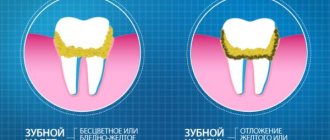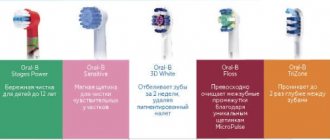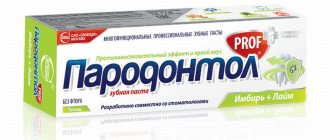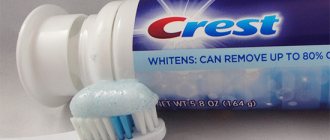A daily set of hygiene procedures for oral care should include not only brushing your teeth with an ordinary brush and toothpaste.
To effectively remove food and bacterial plaque, it is worth using additional devices such as floss, which is also called dental floss.
Among the assortment of the famous Oral-B brand there are several varieties of floss designed for a wide range of consumers. The structural features of the models of this device allow you to choose the appropriate option for different forms of arrangement of elements of the dentition.
How to choose dental floss –
There are a huge number of brands of dental floss, and as a dentist I have tried almost all of them. Unfortunately, very often you remain dissatisfied with the quality of dental floss, namely the fact that it may be too thin or thick, or it may become unfibered, tear and get stuck in the interdental spaces, or it may be uneconomical or simply poorly clean the interdental spaces. I will share my personal experience in this article, but I must say right away that the best dental floss does not exist, because... Different types of threads may be optimal for different patients.
Dental floss was invented in 1819 by a dentist from New Orleans (USA), who recommended his patients to clean the interdental spaces with waxed silk floss. The use of dental floss was not commercial at first, and it was not until 1898 that Johnson & Johnson received the first patent for dental floss made from silk. Around 1943, dental floss began to be made from nylon due to the greater strength of this material.
Modern dental floss is made from 2 materials: firstly, still from nylon, and less often, using polytetrafluoroethylene. An important point when choosing a floss is that the quality of dental floss made from the same nylon varies greatly. Unfortunately, threads made from inexpensive nylon options begin to tear during the cleaning process and quickly become unfibered, as a result - a piece of thread can sometimes get stuck between the teeth (and will have to be removed with a new fragment of thread).
Some manufacturers, in addition to the fact that dental floss is made of high-quality woven nylon, also have a thin polymer film on top (for even greater strength), and with waxed floss, there is also a thin layer of wax on top of the polymer film. It will be very difficult to break such a thread. This technology is used by Oral-B. However, the same company also has so-called monofilaments, which are made not from braided, but from a single solid fiber.
The second main difference is that threads can be produced waxed or unwaxed. Waxed dental floss is coated on the outside with a thin layer of wax, which makes it easier to glide between teeth and also gives the mouth a cleaner feel due to the fact that the wax may be impregnated with fluoride or menthol.
Waxed and unwaxed dental floss: which is better?
A study published by the Journal of Periodontology found that 79% of those surveyed preferred waxed floss. Moreover, patients were given a choice only after they had tried both types of thread. Unwaxed floss was preferred only by those patients who had crowded teeth and very narrow interdental spaces (this type of floss is somewhat thinner due to the absence of a wax layer).
If there are no Russian names on the packaging of the thread, then the package with waxed thread will additionally indicate “Waxed”, and the package with unwaxed thread will indicate “Unwaxed”. Oral-b's packages of waxed and unwaxed threads look almost identical, so don't get confused. In the photo below you can see the same dental floss “Oral-B Essential Floss” - Russian and European production, and both options can be found in Russian online stores. Pay attention to the “Waxed” marking.
The advantage of waxed threads is that the wax can be additionally impregnated with fluorides, which makes it possible to further protect the interdental spaces from caries. In this case, the packaging of the dental floss will say “contains fluoride” (Fluorid). Typically, for these purposes, manufacturers use a compound such as sodium fluoride (at a concentration of 200 ppm), which will additionally inhibit the growth of bacteria and protect tooth enamel from destruction.
Also, many patients noticed that waxed threads become less filamentous and tear during the cleaning process. This is also due to the fact that they are coated with a layer of wax, which further protects the interwoven nylon fibers (24stoma.ru). Unwaxed threads disintegrate much faster, and therefore many patients complained that they had to tear off the dental floss not once per brushing, but twice (thus increasing its consumption).
Important: Clinical studies conducted by the American Dental Association (ADA) have shown that there is no statistically significant difference between waxed and unwaxed floss in terms of interdental cleaning performance. And the choice between them lies solely in the sphere of your preferences. The most important thing here is that you do this procedure regularly after each meal, and not periodically on occasion.
It should be noted that waxed threads from different manufacturers have slightly different thicknesses. Therefore, if you have crowded teeth or very narrow spaces between teeth, then you are better off choosing either completely unwaxed or thin waxed floss. If you have poorly placed fillings in some interdental spaces that can loosen or tear the dental floss during the cleaning process, it is also better for you to choose waxed floss, because... this type of thread is stronger (and it’s even better to replace such fillings).
If you have wide interdental spaces, then thin threads will not suit you a priori. You need to buy thicker, bulky floss - Sensodyne or Elmex, or dental floss such as Oral-B Super Floss. The latter is designed specifically for braces, fixed dentures, as well as for wide interdental spaces.
Types of products
An important feature of Oral-B dental floss is its versatility and wide range. Based on the shape of the surface, waxed and unwaxed flosses from this manufacturer are distinguished.
Waxed products are recommended for use by those who are experiencing this type of teeth cleaning for the first time. They are durable, have a gentle effect on the gums, easily penetrate into the interdental space and do not require effort for proper gliding.
Dentists recommend using waxed floss for people with dense teeth and tight spaces between them.
Unwaxed threads do not have a wax coating, which causes slight separation of the fibers during use. This helps to increase the contact area.
The friction force of these products is quite high, due to which plaque is cleaned more effectively.
Based on the cross-sectional shape, there are three types of threads present in the Oral-B product range:
- Flat flosses are preferably used for small gaps between teeth. This ensures safety during cleaning.
- If there are large gaps in the interdental space, floss with a round cross-section will most effectively cope with plaque .
- Gaps between teeth, trema or diastema require the use of special threads in the form of a tape with a wide surface .
The described structural features are found in a number of the company’s models, which are especially popular.
Watch the video about the rules for choosing products.
Satin Floss
Oral-B Satin Floss is made of natural silk and presented in the form of a flat tape, thanks to which it penetrates into the narrow spaces of the interdental space, effectively eliminating plaque.
The structural features of the floss, developed and tested by manufacturers, guarantee a lot of advantages when using this device:
- thanks to the increased flexibility of silk, the thread fits tightly to the neck of the crown, removing deposits and without injuring the gums;
- the polymer coating of the tape protects it from fiber delamination and slipping in the hands during use;
- the two-layer structure facilitates the movement of the product between the teeth, removing food debris and reducing the risk of developing caries;
- due to its softness, floss is intended for use by people with hypersensitive gums;
- The mint aroma with which the tape is saturated leaves fresh breath after use.
The thread is sold in a special foulard. Its length is 25 meters. The average cost of a product in pharmacies and stores ranges from 250-300 rubles.
Pro-Expert
The key feature of this type of floss is its minimal thickness. The floss penetrates into very small crevices, cleaning the tooth surface from the resulting plaque.
Due to its small thickness, floss removes deposits not only up to the line of contact with the gums, but also below it. This helps improve the condition of the gums and prevents the accumulation of microbes.
Dentists also note the following advantages that the use of this floss brings:
- eliminating the possibility of injury to the delicate surface of the gums due to the easy sliding of the thread, which does not require additional effort;
- the strength of the thread eliminates the possibility of it breaking and damaging the surface being treated;
- thanks to the special coating, the possibility of the product accidentally slipping out of the fingers during cleaning of the oral cavity is minimized;
- The mint aroma and taste with which the thread is impregnated guarantees a long-lasting feeling of freshness in the mouth after use.
The thread is available for sale in 25 meter lengths. It is packed in a special container that guarantees its integrity and undamage along its entire length.
The cost of Pro-Expert floss is 150-190 rubles, depending on the place of sale.
Essential Floss
The Essential Floss model is available for sale in two varieties - in the form of a waxed thread and an unwaxed product . Both floss options are made using the technology of weaving together many nylon threads.
This guarantees the strength of the product and the impossibility of its delamination or breakage during use. On top, such a mono-textured structure is covered with a polymer material, which facilitates the sliding of the thread in the interdental space.
Experts recommend using the waxed version of Essential Floss in case of closely spaced teeth.
The unwaxed option is suitable for normal crown spacing to clean the surface of the tooth above and below the gum line. This model is ideal for people with normal dental structure and no orthodontic structures.
By analogy with other models of the manufacturer, Essential Floss is impregnated with mint essence, however, there are also forms of thread on sale that have no taste or aroma.
The length of the floss, placed in an ergonomic case, is 50 meters, so one package is enough for a long time. The cost of this model is 180-200 rubles.
Find out whether it is possible to treat periodontal disease at home and patient reviews of traditional recipes. Click here to find out what can cause a crack on the tip of your tongue.
At this address https://dr-zubov.ru/ortopediya/nesemnye-protezy/mosty/xarakteristika-adgezivnogo-i-metody-krepleniya.html you are offered material about the adhesive bridge prosthesis and its disadvantages.
Super Floss
Super Floss dental floss has distinctive structural features that allow it to penetrate into areas of the interdental space that other models do not have access to.
It consists of three elements:
- The hard fiber is located at the tip of the product . Thanks to it, the thread freely penetrates into the narrow gaps between the parts of the orthodontic structure.
- Thanks to the sponge fiber, food debris and plaque that accumulate under the elements of braces are removed.
- The conventional floss zone is designed to remove deposits in areas of the dentition that are free from the orthodontic product.
All three components of Super Floss interact with each other to help remove plaque when using braces and bridges.
The Super Floss model has the following advantages:
- thanks to its special structure, it penetrates into hard-to-reach areas and effectively removes plaque;
- convenient to use due to release in the form of measured sections necessary for one-time use;
- special impregnation provides protection against caries and strengthens the enamel.
The length of the product, packed in a special container, is 50 measured pieces.
The cost of the model ranges from 300 to 350 rubles.
Dental floss Elmex (Elmex) –
Elmex dental floss is a so-called “bulk floss”, i.e. it becomes more voluminous in the process of cleaning the interdental spaces and wetting with saliva. Due to this, the quality of cleaning the interdental spaces increases, but there is also a limitation - this thread is suitable for patients with normal or wide interdental spaces. If your teeth are very close to each other, it is better to opt for Oral-b dental floss (for example, Oral-b Essential Floss).
Dental floss Elmex (Elmex) –
Elmex waxed thread consists of 144 thin nylon fibers coated with a polymer sheath. The thread is very resistant to tearing, and can break or become loose only in one case - if there are incorrectly placed fillings in the interdental spaces. The thread is impregnated with the most effective anti-caries agent - amino fluoride, which provides additional protection against the occurrence of so-called interdental caries. The thread has a pleasant minty taste.
In principle, Elmex dental floss in its properties, thickness, and manufacturing technology is almost completely similar to Sensodyne dental floss (see below). The price for Elmex thread starts from 250 rubles, and the package contains 50 meters of thread, and not 30 meters - like Sensodyne. In general, this is a very worthy thread, which we recommend (although here I would like to make a small remark - if you already have the skill of using dental floss; if not, then it is better to start with thinner Oral-B threads).
Advantages
The Oral-B brand has the following distinctive features of its products:
- Increased elasticity - thanks to this, Oral-B flosses do not tear during use and easily penetrate into hard-to-reach interdental spaces, completely clearing them of remaining food particles;
- Special thread structure. Oral-B flosses are distinguished by their monostructure - that is, the finest fibers are united by a polymer shell, thereby forming a single whole. This factor greatly facilitates the use of the product - the thread does not slip in your hands during cleaning, and is also not prone to delamination, breaking or getting stuck;
- Specialized impregnation composition. This treatment of Oral-B floss fibers with a specialized solution reduces the risk of developing caries and gum inflammation;
- Variability of taste. This line of products allows you to choose a product according to your taste preferences. People who don't like the minty taste can opt for neutral Oral-B dental floss, while others can use mint-flavored floss - this product guarantees a fresh feeling in the oral cavity for a long time;
- Convenient packaging. The sealed, closed, compact container reliably protects Oral-B products from unwanted contamination and ensures comfortable use. In addition, each package is equipped with an individual built-in device for cutting the thread to the required length;
- High quality and reasonable price. The last item on our list, but not the least important, and often the most important factor in making a purchasing decision.
Dental floss Sensodyne (Sensodyne) –
Sensodyne waxed dental floss has a fresh mint flavor and is additionally impregnated with sodium fluoride - at a concentration of 200 ppm. The peculiarity of this thread is that in the process of cleaning and wetting the thread with saliva, the thread becomes voluminous, which makes it possible to perfectly clean the interdental spaces. However, this floss may not be suitable for those who have very narrow interdental spaces. According to the personal experience of the author of the article, the quality of Sensodyne floss is slightly higher than that of Elmex dental floss (for example, Elmex still sometimes breaks in the interdental spaces).
Bulk dental floss Sensodyne –
But this dental floss also has the best reviews. During all the time of use, the Sensodyne thread has never broken (but the author of the article does not have overhanging edges of fillings in the interdental spaces, so how it will behave in the presence of them is unknown). This thread gives an excellent clean feel and again, we only ranked it #2 because of its high price. On Sensodyne, dental floss costs an average of 250 rubles, but the package contains only 30 meters of floss.
By the way, Sensodyne dental floss (as well as Elmex floss) is an analogue of the famous Swiss dental floss, but only at a much more affordable price. It was the Curaprox company that invented the technology for making bulky dental floss, but the original Curaprox dental floss will cost you about 2,500 rubles.
Sensodyne bulk dental floss: video
Dental floss Oral-B (Oral-B) –
There are several models of Oral Bee dental floss, each of which has its own advantages. For example, one model of thread is more suitable for thin interdental spaces, another does not break even if there are sharp edges of fillings hanging in the interdental spaces, the third is universal. Below we will look at several options for Oral-b dental floss.
- Oral-B Essential Floss - consists of nylon fibers coated on the outside with a polymer film, which gives the floss additional strength and does not allow it to easily fray when brushing. This thread option can be waxed or unwaxed, and this information is usually written in Russian. However, on European-made packaging this information may be written in English - “Waxed” (on Polish-made packaging - “Woskowana”), and on packaging with unwaxed thread - “Unwaxed”.
Keep in mind that the waxed version of Oral-B Essential Floss will be slightly thicker, while the unwaxed floss will be thinner and have a less menthol flavor. This is an excellent option for dental floss in terms of quality and price; they very rarely break or become loose. Their cost will be on average only about 200 rubles (in a package of 50 m), but the promotional price usually starts from 140 rubles. This makes this dental floss option the most attractive in price.
- Oral-b PRO-EXPERT dental floss (Clinic Line) – this version of dental floss has the highest strength. This is due to the fact that this thread is made in the form of a monofilament (while most other threads are multifilament, i.e. they have a large number of nylon threads intertwined with each other). This makes this dental floss very convenient for patients in whom other floss often breaks and becomes loose in the interdental spaces.
The thread is made in the form of a wide thin ribbon, impregnated with a strong menthol aroma, and there is no layer of wax on it. The cost will be from 250 to 280 rubles, and the package contains only 25 m (which makes it 1.5-2 times more expensive than most other dental floss).
- Oral-B Satin Floss – this version of dental floss is also made in the form of a tape, very thin, but wide. This floss is most suitable for patients with crowded teeth and very narrow interdental spaces. The fiber of the floss is very smooth and it glides easily between the teeth. The thread has a pleasant menthol aroma. Please note that this is unwaxed thread, i.e. it comes without a layer of wax.
We recommend its use only in patients with very narrow interdental spaces. In other cases, it is better to choose other types of threads (listed above). The cost is about 230 rubles, and the package contains only 25 meters of thread.
But, as you will understand below: the most difficult thing is not choosing dental floss, but how to use dental floss correctly. This skill is quite difficult, but with regular practice you can become reasonably proficient in just a few weeks. Moreover, it will be easiest for people who have well-developed fine motor skills.
→ Rating of the 2021 best toothpastes → Fluoridation and remineralization of teeth
What are there
Oral-B floss can have a waxed or unwaxed surface.
Waxed dental floss has its own operational characteristics and is recommended for those who have dense teeth or even for those who are just getting acquainted with this type of care products, because:
- Easily penetrate even the most remote interdental spaces;
- Provide easy gliding without additional effort;
- They have high strength;
- Gently cleans the gum line.
Oral-B wax-free dental floss has a maximum coefficient of friction, meaning it can clean large areas of the surface of the teeth, and because of this, cleaning the interdental space and gum line of plaque and food particles is most effective.
Also, Oral-B flosses may differ from each other in the form of release - this criterion affects the effectiveness of the tasks assigned to the product, as follows:
- People with rather narrow dental gaps are recommended to use flat threads;
- Persons with the opposite problem, that is, with large interdental spaces (tremas and diastemas), use round threads or tapes with a larger width.
How to use dental floss correctly -
The most important thing is that you should use floss not 1-2 times a day, but strictly after every meal (even if you don’t feel like you have something stuck between your teeth).
You will be surprised how much you can extract from the spaces between your teeth - even after eating a regular loaf of bread. Unlike a toothbrush and paste, a package of dental floss takes up little space, so you can and should always carry it with you if you eat outside of the home. You can easily use dental floss not only at home, but also when visiting, in the toilet at work or in a restaurant, and even on the street. At first, you should floss only in front of a mirror so as not to damage your gums. But over time, you will develop good skills, and you will be able to do this even without a mirror, and only 1 minute will be enough for you (although at first, of course, you will need more time).
Important: Below you will see an improved technique for using dental floss. The author of the article developed it and taught it to thousands of his patients over 20 years of work. The traditional technique suggests making only vertical movements in the interdental space (with a small fragment of thread), but in fact this removes only part of the food debris from the interdental space. A significant part will remain untouched, and vertical movement of the thread can lead to food debris getting under the gum.
How to brush your teeth with dental floss: instructions
First you need to unwind a small piece of thread - about 40 cm long, and tear it off from the skein. There is a special small metal protrusion for this purpose. Thus, you first need to unwind the thread, then put it behind the protrusion and pull it. Floss your teeth only in front of a mirror in a well-lit room so that you can observe how the floss passes through the interdental spaces, and do not immerse it under the gum deeper than 1 mm (this is slightly less than the depth of the periodontal sulcus). This will prevent injury to the gums. Start with the upper teeth, then move to the lower teeth.
To begin, you must wind the thread around the index finger on your right hand in such a way (so that the thread is firmly fixed and does not slip), and then position the thread so that it passes along the pad of the thumb of your right hand. The second end of the thread will remain tightly clamped between the thumb and forefinger of your left hand (there is no need to wind it). Holding the floss like this, you can clean all the teeth of the upper jaw, as well as the front and side teeth of the lower jaw on the right, but with the exception of the teeth on the left half of the lower jaw. In the latter case, the thread will have to be intercepted with the other hand.
How to correctly insert floss into the interdental space -
To insert the floss into the interdental space, you need to clamp it so that the length of the thread between the fingers of your left and right hands is initially no more than 3-4 cm. This is very important for the safe insertion of the floss into the interdental space. If the fragment of thread held between the fingers of both hands is too long, the thread will bend greatly at the moment of insertion (at the site of the contact point between the teeth), and then sharply go under the gum, injuring it.
After you have inserted the floss into the gap between your front teeth, you must pull the floss away from you with your right hand so that the rest of its length (held in your right hand) passes through the interdental space. It is important that you maintain tension on the thread with your left hand. The thread should not be thrown (by releasing it with your left hand), or it should not be tensioned well. The floss should be in constant tension when you pass it through the interdental space, and slide along the side surface and neck of the tooth.
Because There are 2 tooth surfaces in each interdental space and you will need to clean each surface - the floss must be inserted into each interdental space twice. Teeth have an uneven rounded surface, so hold the floss with your hands so that the floss bends slightly around the tooth in the interdental space each time, while simultaneously pulling the floss through it. This is such a difficult skill. It will be difficult at first, but with constant use of thread you will quickly be able to adapt to this process.
Important: you need to brush all the interdental spaces, not just between the front teeth. In addition, the floss should not be inserted deep under the gum (in the area of the interdental gingival papilla). Blood staining of the floss will indicate either that you are inserting the floss too deeply or that you have gum disease. If you have periodontal pockets, you still won’t be able to clean them with dental floss - you need to do this with the help of an oral irrigator. Below you can also see the correct technique for using a toothbrush.
Teeth brushing technique: video
Instructions for use
Using floss in the process of oral hygiene helps prevent the loss of minerals and neutralize the effects of destructive acids.
However, to achieve this result, you should follow some rules when using the thread:
- Before carrying out the procedure, wash and dry your hands thoroughly .
- is removed from the container and cut off using the built-in knife. With subsequent use, the length of the thread required to clean the entire oral cavity is reduced or increased if necessary.
- Wrapping the index fingers of both hands , secure a piece of thread about 5 cm long.
- The segment fixed between the fingers is inserted into the area between the teeth, leading to the gum line. The thread is carefully inserted shallowly under the gum to surround the neck of the crown, after which smooth movements are made to remove plaque.
- Performing longitudinal movements, the thread is lifted to the top of the tooth.
- In this way, the interdental space of the entire oral cavity is cleansed. In this case, the piece of thread is changed to a new one each time.
It is worth understanding that before deciding whether to use dental floss, you should consult with your dentist. The presence of diseases and damage to the gums or teeth is a contraindication to the use of floss.
For more detailed instructions on using thread, see the video.
Floss toothpick with holder –
Pharmacies sell many rather unhelpful oral care products on the shelves, which cost much more than high-quality dental floss, but at the same time cannot compare with them in effectiveness. An example of such a useless product is toothpick floss (Fig. 17). Too short a length of dental floss, clamped in the holder, does not allow cleaning the interdental spaces as efficiently as can be done with a piece of regular dental floss 35-40 cm long, dragging it through the interdental spaces.
A floss toothpick with a holder allows you to make almost only vertical movements in the interdental space. This leads to the fact that food from the interdental space, on the contrary, can be pushed under the gum (this problem is especially typical in patients with periodontal pockets). In general, this is an ordinary marketing product, the demand for which is developed through advertising. But in any case, even a floss toothpick is better than if you don’t do interdental hygiene at all.
Interdental brushes for cleaning teeth –
Dental brushes are usually recommended by dentists when you have orthodontic appliances in your mouth. For the hygiene of interdental spaces, this is not the best remedy (for example, simply because it is more traumatic) - due to the fact that they are based on wire. Regular use of brushes can lead to injury to the interdental gingival papillae and their recession, i.e. reducing the volume they occupy in the interdental spaces. And this can already lead to aesthetic problems.
Thus, interdental brushes of standard sizes are somewhat traumatic and, in our opinion, are only suitable for patients with wide interdental spaces. The smallest size brushes are essentially disposable, i.e. they almost immediately become unusable. Therefore, the use of brushes, compared to dental floss, will not be as effective, plus it will be much more expensive.
But there is also a benefit from dental brushes. For example, we may recommend the use of interdental brushes for patients who have poor fine motor skills and are therefore unable to master the skill of flossing. By the way, we recommend that such patients also use a sonic toothbrush, because... By creating a fluid flow, it helps clean the interdental spaces (to a depth of 4 mm).
Summary -
When you dine out, dental floss and chewing gum become a salvation from tooth decay and bad breath. If you are embarrassed to go to the toilet to brush your teeth in front of your colleagues at work, then dental floss has a compact size, allowing you to discreetly brush your teeth almost anywhere. If you are at home, after brushing your teeth with floss, use a toothbrush and toothpaste; if you are away from home, after brushing your teeth with floss, you can use chewing gum or a special mouthwash.
Remember that flossing and chewing gum are the bare minimum to maintain good oral hygiene if you don't have a toothbrush and toothpaste on hand. If you use our advice, then you (as well as the author of the article) will not have a single focus of carious lesions. We hope that our article on the topic: How to use dental floss correctly was useful to you!
Sources:
1. Dental education of the author of the article, 2. Based on personal experience of use, 3. National Library of Medicine (USA), 4. “Therapeutic dentistry. Textbook" (Borovsky E.), 5. Information resources of manufacturing companies.
Satin Floss
- Material: nylon;
- Length per skein: 25 meters;
- Feature: waxed, tape;
- Taste : mint.
The basis of the interdental floss Oral-bi Sanit Floss is oval nylon fibers enclosed in a polymer shell. When brushing your teeth, the floss does not slip, it is easy to wrap around your fingers, and it does not break. The product is not prone to delamination and perfectly retains its original shape.
They are produced in the form of a flat tape, due to which there is a more effective and high-quality cleansing of bacterial plaque and food debris even in hard-to-reach places (compared to the usual form of threads), which prevents the occurrence of caries and gum disease.
The special silky waxed structure of Oral-B Satin Floss threads allows you to carry out hygienic procedures without the risk of injury to soft tissues - as it glides easily even between teeth that are tightly spaced together. This product, soft in structure, is recommended for use even by people with highly sensitive gums.
We have prepared for you a review of the Panasonic EW 1211 irrigator. You can read it in a separate article. And here you can read reviews about Rox whitening toothpaste.
The minty scent of Oral-B Satin Floss will leave you with an invigorating feeling of freshness for a long time.
The cost of one package varies around 250-300 rubles.











